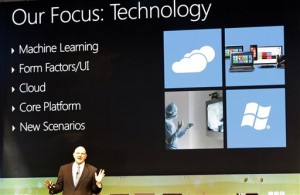Microsoft sees ‘rebirth’ with new Windows 8 system

Microsoft CEO Steve Ballmer delivers a speech during Seoul Digital Forum in Seoul, South Korea, Tuesday, May 22, 2012. AP PHOTO/LEE JIN-MAN
SEOUL—Microsoft’s upcoming Windows 8 series – featuring an upgraded cloud computing service – marks a “rebirth” of its operating systems, chief executive Steve Ballmer said Tuesday.
Ballmer described Windows 8 as the “deepest, broadest and most impactful” Windows software ever created by the US tech giant, after the current Windows 7 sold at unprecedented rates to businesses.
“It’s really, in some senses, a dawning of the rebirth of MS Windows… It’s certainly the most important piece of work we’ve done,” he said in a speech to the Seoul Digital Forum.
Windows 8, whose preview version will be released in June, allows users readily to store and share personal data among various devices under the “SkyDrive” cloud computing service. Rival Apple already offers such a service.
The new Microsoft system will support a wider range of devices, including touch- and stylus-based smartphones and tablet PCs as well as desktop and laptop machines, Ballmer said.
The software giant has been trying to expand its presence in the booming software market for smartphones and tablets, which is currently dominated by Apple and Google.
Ballmer predicted that the cloud computing market would become dominated by a few big players.
“The number of core (cloud) platforms, around which software developers will do their innovation, is not ever-broadening,” he said.
“It’s really a quite smaller and focused number – Windows, various forms of Linux, the Apple ecosystem.”
In three to five years from now, “there will be just a few ecosystems that really can get the critical mass,” he said.
Ballmer estimated up to 500 million users will have Windows 8 next year, promising the “best economic opportunity” for device makers and app developers who adopt the new system.
Microsoft will also soon introduce Skype powered by Windows 8, Ballmer said. His company last year bought the leading Internet video and voice-calling service for $8.5 billion.